11 min read
101 Guide on How & When to Start Brushing Baby Teeth
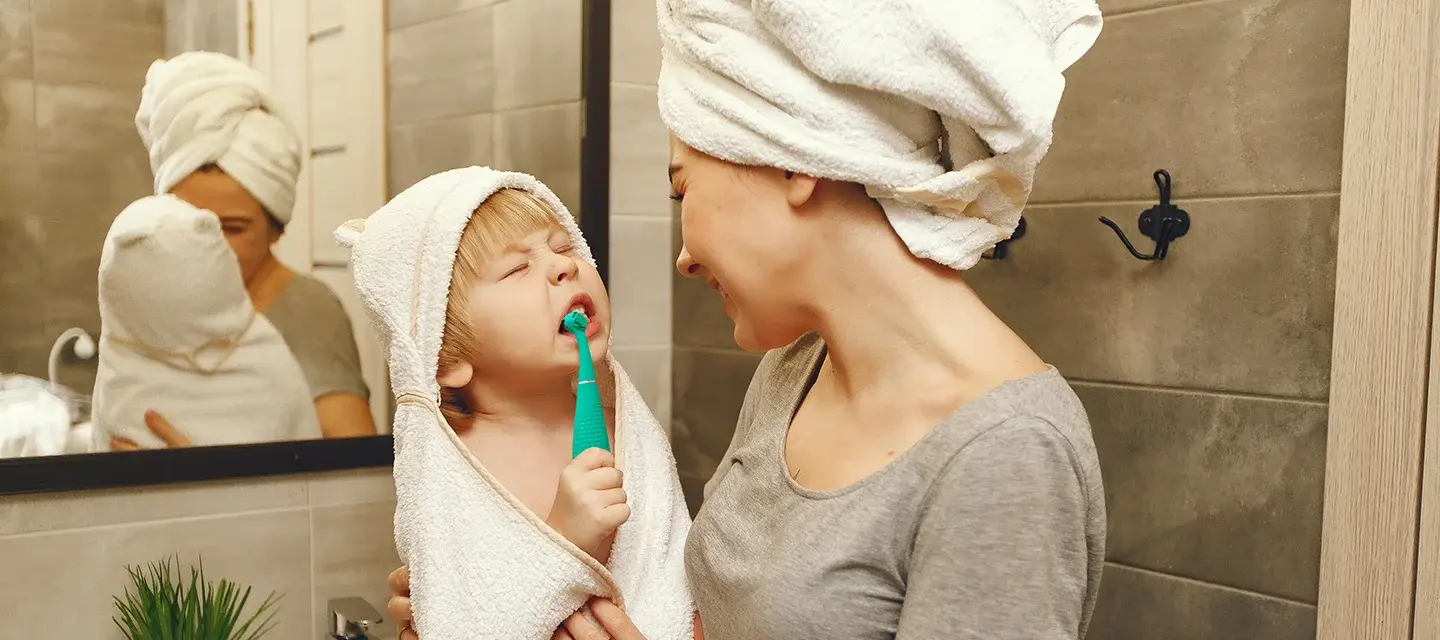
Let me tell you, not even the Tooth Fairy is quite sure about this one, so you're not alone. Millions of parents worldwide are receiving (solicited or unsolicited) advice left and right, and some of it is right, some wrong, some harmful, while others make no difference at all. That's why we're here today. To quickly (because you're on a mommy/daddy schedule) go through the most important questions regarding oral health before the first tooth and baby teeth brushing once the first one pops. We'll go over some big ones like:
When to start brushing baby teeth?
- How can you survive without tears (yours or the kids)?
- What are some practical tips for brushing baby teeth?
- Are all toothpastes made equal when brushing baby teeth?
- Why baby first teeth care matters, even though the teeth are not permanent?
Let's learn something new, and hope we'll sleep tonight to maybe retain some of it.
When to Start Brushing Baby Teeth
We do call it tooth brushing because it makes for an easier bucket term that everyone understands, but it actually pertains to complete oral health, especially if we're talking about newborns or small babies. So, should you wait for that first tooth to erupt, or can you start cleaning that funny gummy smile you love?
Start as soon as a few days after birth by gently wiping the gums with a very soft, damp cloth. Bacteria will not wait for the first tooth but start developing on the remnants of milk or formula in your baby's mouth. If you introduce this cloth wiping early, you'll allow the baby to get used to the sensation, which will make an easier transition to infant toothbrushes once the first teeth come in and the subsequent building of healthy oral habits.
You should also schedule a first dentist visit within the first year and ensure your child has a positive experience to establish a foundation of trust rather than stress. Pediatric associations like the AAP and ADA agree that a first dental visit should happen before your baby turns one or within six months of the first tooth surfacing, just to make sure everything is ok and that your child perceives the dentist's office as a non-threatening, fun place. Choose a dentist you can trust, and who builds good relationships with their small patients. This will save you a lot of grief later.
Brushing Baby Teeth: How & When?
If you've ever been annoyed by moms telling you how many months their child has, rudely making you do the math to figure out how old the baby in front of you is, she is not insane or suffering from mommy's brain. It's because whether you are 22 or 23 years old doesn't make any real difference, but being 13 or 23 months old is an entirely different little person. That's why parents keep track of their baby's age in months. A few months apart also means very different needs when it comes to baby oral hygiene. Take the recommendations from the ADA and general oral health guidelines as a basis.
Birth to 6 Months
- Wipe your gums with a soft, damp cloth after feeding and at bedtime to remove any bits of food or milk residue.
- Avoid putting a baby to bed with a bottle if possible. If it keeps your sanity, it's fine here and there, but don't make this a habit.
- Don't put the kids' pacifier in your mouth to clean it or share feeding spoons; you have bacteria in your mouth, and your baby's gums are not yet ready to handle it. Refrain from making pacifiers more appealing by dipping them in any food the baby is not ready for, like sugar or honey. This may help with the fussiness but will not do them any favors.
6 to 12 Months
- This is the time when the first teeth usually appear. It's a good time to schedule the first dental visit by the first birthday.
- Once the first tooth pushes out and you're still in the surviving teething mode, you should start brushing twice a day
- with a smear (rice-sized amount) of fluoride toothpaste.
- Choose a small, soft-bristled infant toothbrush or the new version of ultra-hygienic medical-grade silicone toothbrushes that can even be chewed and cleaned as a baby gnaws on them, which they will inevitably do. This will also help alleviate teething discomfort and begin to instill good oral health habits.
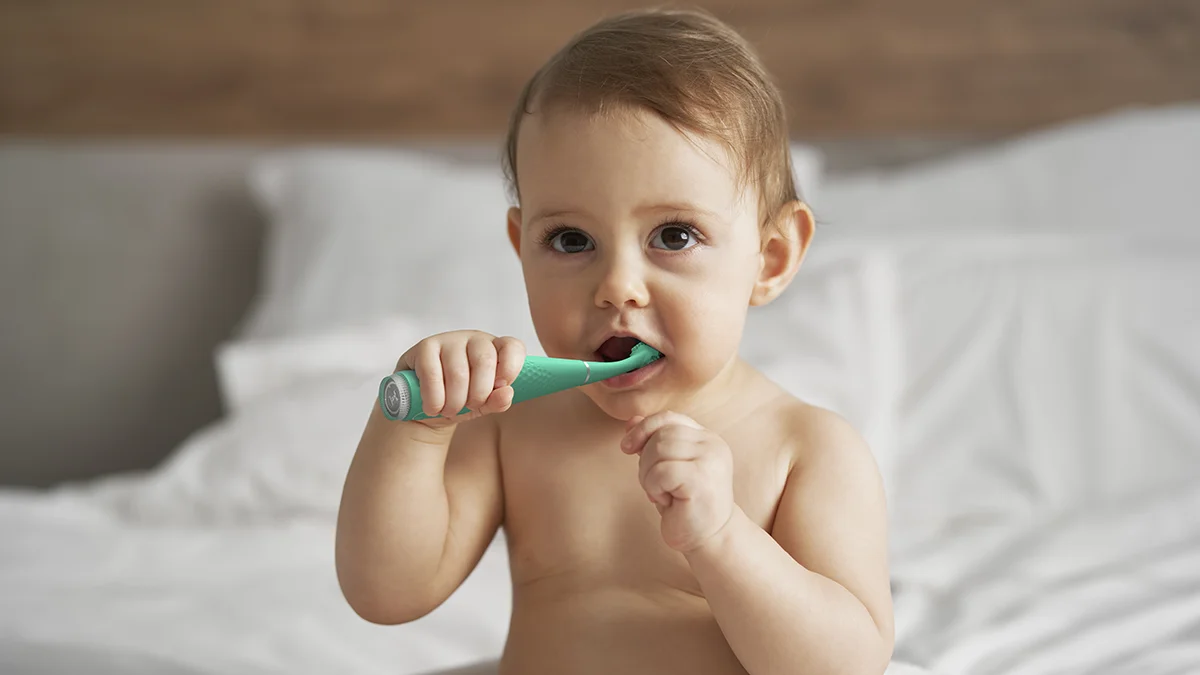
12 to 24 Months
- If your child is still using the bottle, the time to wean is between 12 and 14 months.
- Continue brushing twice a day with a rice-sized amount of fluoride toothpaste.
- Avoid sugary snacks and drinks whenever possible. These should be a rare treat if you choose to allow them, and not a daily habit.
- Schedule regular dental visits so your child gets used to the dentist as a normal part of their life.
2 to 5 Years
- You can increase the toothpaste amount to a pea-sized squeeze.
- Don't leave your child unsupervised while brushing. They're still too young for the fine motor skills and dexterity needed for proper brushing. Be there if they can't be trusted not to swallow the toothpaste. If they can do some things without any help, keep an eye on them but allow them the autonomy they're capable of.
- Once there are more teeth in the mouth that touch, you can start gently flossing.
- But basically, this is the age when you lay the groundwork for a lifetime of healthy habits. Teach a healthy lifestyle by example and talk to them about foods that protect and harm teeth. Talk about the importance of fruit, vegetables, and whole foods. Be very deliberate and strict around snacks and limit sugary beverages.
Baby Teeth Brushing: Choosing Tools
New parents are now in a significantly better position than their parents or grandparents when it comes to childcare tools to help navigate various developmental phases. However, being lucky and feeling lucky are not the same. Being swamped with choices can easily mean getting paralyzed by the abundance of options. Many brands offer useful implements, so we'll focus on the main points to consider when selecting tools for your child's teething discomfort and oral care.
We've already mentioned using a soft, damp cloth to clean the infant's gums. Use only water before the first tooth. You can even keep using just water for brushing until 18 months. Finger brushes also work well if that makes it easier for you. Once you're ready to transition to a toothbrush, bear in mind these key points that will make your life easier:
Softness
Select a toothbrush designed specifically for infants or young children, featuring soft bristles. Their gums are still delicate and more sensitive than adults' and can easily get irritated. You can also avoid nylon bristles and opt for ultra-hygienic, super-soft silicone, like the issa™ 4 baby from the new issa™ 4 collection.
Brush head size
Make it small enough that you have easy maneuverability rather than only fitting the brush into your child's mouth. Prioritize an infant toothbrush with a circular shape, smooth edges, and a non-detachable head for safety because the kids will fidget. It is what they do; they get up early just to fidget with a vengeance in the most inconvenient moments. And since they don't care about convenience and are cute, we adapt to the fidget the best we can.
Grip
If your child is old enough to start practicing holding a toothbrush alone, choose a large handle with a non-slip grip. This will make it easier for the child to hold, create a fun tactile experience, and also make your job easier if you can achieve a good grip in weird angles.
Non-toxic materials
Choose BPA and phthalates-free brushes. Toxins and chemicals can easily mess up the large bodies of grown-ups, so how could it be safe for these little bodies that are still learning how to deal with their environment? Non-porous and quick-drying materials are also a bonus, as bacteria and yeast thrive in damp environments, and no one wants their kid to chew a bacteria stick daily.
Fun design
Choose a toothbrush that has some toy-like elements, especially if your child is quite resistant to brushing. Colorful, fun shapes, music, or light-up features will make it more interesting and perhaps lower their resistance to brushing.
Durability
Replace your baby's toothbrush as soon as it frays, typically after around 3 months of daily use for nylon bristles due to normal wear and tear. Or you can go with the 100% (soft but sturdy) silicone brushes that can last up to 6 months, even with chewing.
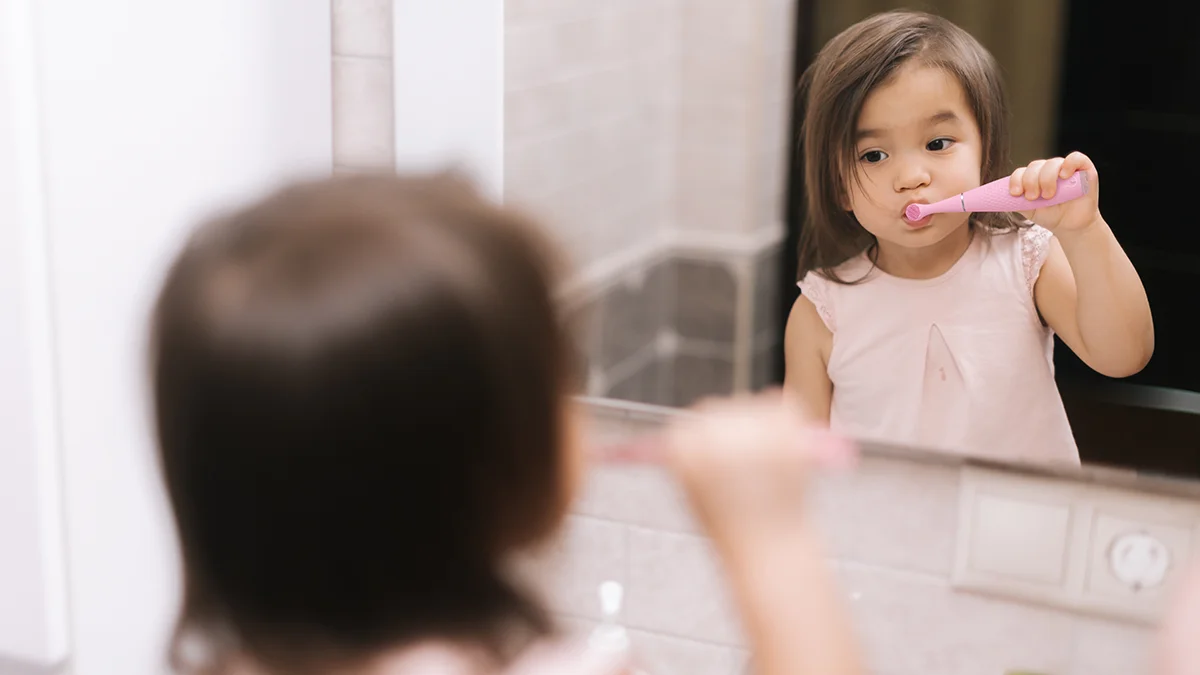
Why Does Baby First Teeth Care Matter
There is a misconception circulating that care for baby teeth (10 in the upper jaw and 10 in the lower jaw) is not as important as caring for permanent teeth. Why should we care if they'll fall out anyway, right? Wrong. Baby teeth are not there to look pretty in pictures. They serve several purposes, including speech development, chewing, and as guides for permanent teeth, which in turn affect overall health. Pain, infection, and serious misalignments that may need an orthodontist's intervention afterward are the risks of neglecting our children's baby teeth. So why does brushing baby teeth matter?
- Proper speech development - teeth, mouth shapes, and tongue help form sounds.
- Digestion - Chewing begins the digestion process and prepares the food that reaches the stomach for proper breakdown and nutrient extraction. Try to swallow your food whole one day. How does your stomach feel after?
- Bone development - proper tooth development guides the bones of the face and jaw into their correct positions, preparing the framework for when permanent teeth arrive.
- Cavities and tooth loss - Losing baby teeth early can shift the positions of surrounding teeth, misaligning the permanent teeth and potentially requiring braces to correct crowded or gapped teeth.
- Health in general - Poor oral hygiene and unhealthy teeth can become infected, causing significant pain and potentially harming other body systems besides the mouth.
Tips for Brushing Baby Teeth
- Use small circular motions, and don't force it. You may enjoy a more vigorous brush now and then, but small children's gums are way more sensitive, and primary teeth have thinner enamel.
- Help the child associate teeth brushing with something peaceful rather than a stressful or forced period. Set up a routine to do it in calm times, such as after a bath or before a bedtime story.
- You're an adult, and still, knowing all you know, you find brushing your teeth boring. Make brushing fun for your kids - sing songs, play games, tell stories, or let them watch you brush your teeth first and then mirror you.
- Even if your baby can't master fine motor skills yet, let them try brushing themselves with a very safe toothbrush.
- Use the lap-to-lap or cradle hold for secure brushing, especially if you have a very fidgety child who has trouble staying (relatively) still.
- The child won't be able to spit the toothpaste out reliably by around 4,5 years old, so make sure they don't swallow (a lot) by angling their head slightly forward to dribble out any excess.
- If you have fluoride in your drinking water, there is no need to choose a toothpaste that contains it. If the child gets too much, they may get permanent discolorations on their adult teeth.
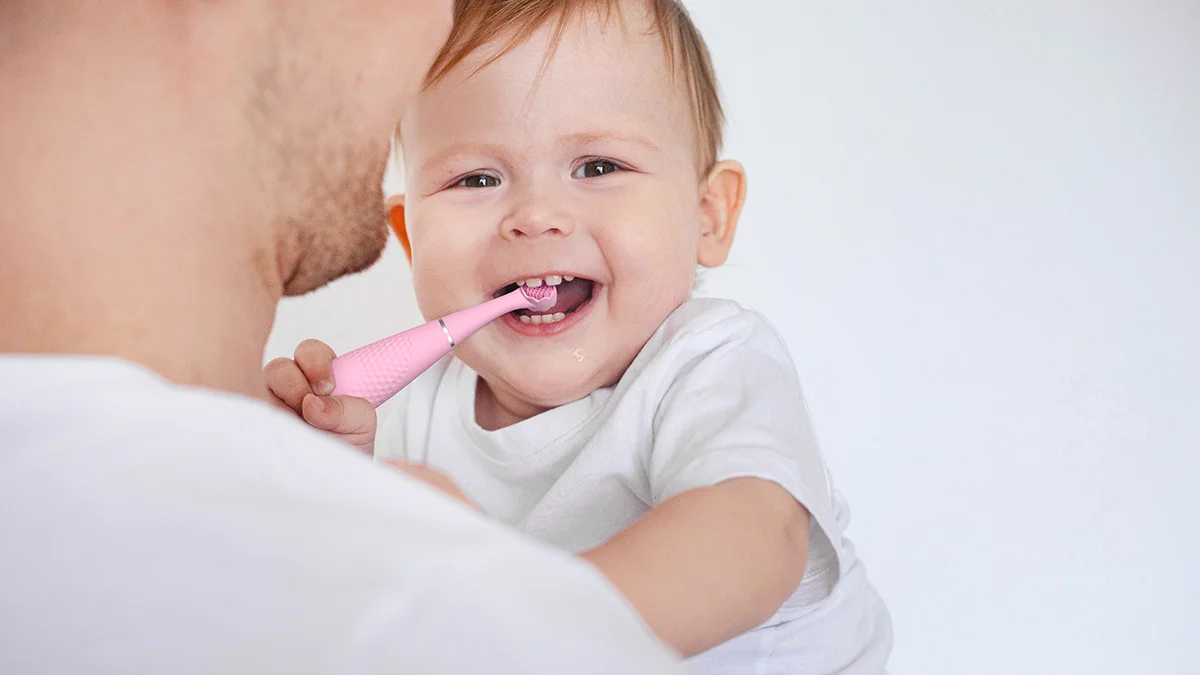
Final thoughts on baby teeth
There are an infinite number of little things to do before your child can be independent enough to do those by themselves. It is a hill that every parent out there climbs, trying not to mess them up too much and feeling inadequate, as if they're drowning in contradictory information.
We hope we've shown you some good practices or given you a good starting pack if you're just starting brushing (or cloth wiping). We want you to see all of the inevitable frustration with baby teeth brushing as an investment in creating a responsible new person. Kids are very good at showing you what is important, what really matters, and how leading by example is a powerful tool. When was the last time you paid your dentist a visit?
There are manuals on how to raise a tiny human, bookshelves of them, but real-life situations differ wildly, and in the end, you'll have to use common sense and adapt all advice to your particular situation. You'll be tired, you'll be broke and broken, you'll have your dishwasher and AC go out on the same day as the flu hits, and you'll need to adapt everything you know to your specific circumstance- Don't feel guilty if you're not perfect if you skip a brush or a allow a bit of soda because you were just too exhausted to argue.
From wiping down those funny, toothless gums to mastering the toddler wiggle and counter-wiggling like a boss to choosing the right toothbrush, every little practical tip and success in brushing baby teeth count towards long-term health.
We hope you'll use these tips for brushing baby teeth, choose safe and fun tools, and never underestimate the power of a good brushing song or a silly face in the mirror. Kids remind us that we used to be fun and help us rediscover the joy in daily tasks. It's wonderful to see the world through the eyes of someone who is seeing it for the first time. Every time you pick up that brush, you're doing more than cleaning—you're caring, teaching, protecting. You've got this. The Tooth Fairy is proud of all your efforts.
Women's Day Deals: Up to 50% off with code WOMAN
(Feb 23 - Mar 11)
Why should you even pay attention to FOREO & FAQ's Women's Day deals (besides the huge deals)? This is why:
Sit still, be quiet, smile, you're prettier when you smile, be smart, play dumb, be sexy, don't be vulgar, get it all, apologize for ambition, are you gona eat all of this, I like it waxed, enjoy food, nothing tastes as good as skinny feels, educate yourself, earn, pay more for pink, carry a pepper spray, you can do it all alone... That's the narrative of binary messages our society blasts at women. Be everything to everyone as you lose your mind, a footnote in your own story, with main character energy wasted on checking boxes you never agreed to. And we do it to other women, too.
Aren't you tired of being told who to be, what to want, how to look, and what to do, of judging and getting judged? It's ok to do things just how you want, to not have to/or want to explain yourself, to be "maladjusted", to not want to smile, be touched, or talked to. Show up however you choose and acknowledge other women doing the same - messy hair, emotional-support bunny slippers, cake stains on our gym clothes, and all. Work hard and rest when you need to, be kind to yourself and others, set boundaries for those who are not kind back, and aim for balance rather than impossible balancing acts.

This one is for all who are tired of pretending to care about what someone thinks, all who've been through enough to know their own worth, and those who are making their dream life a reality one decision at a time. Enjoy celebratory FOREO and FAQ™ devices and skincare, and use the code WOMAN from Feb 23 - Mar 11 to get up to 50% off exclusive bundles, individual devices, and skincare items. Enjoy your day, your way!
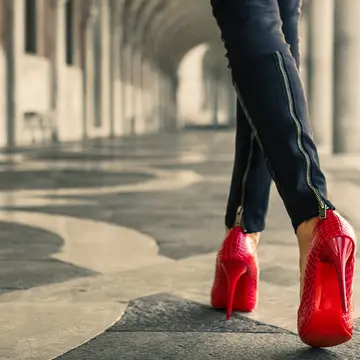
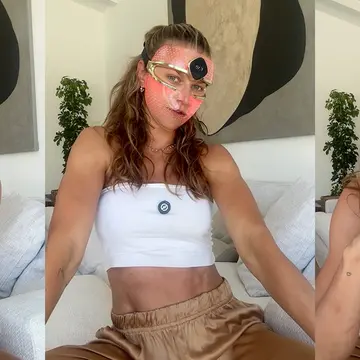






Comments
7 comments
Leave a comment